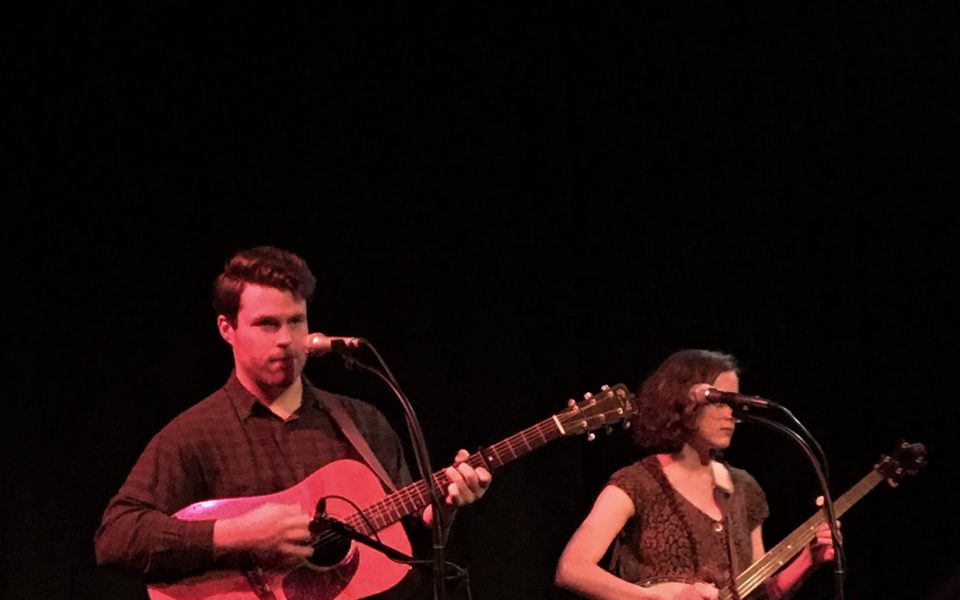Austin McCombie adjusts his guitar strap slightly, leaning into the mic. He sets the scene: a rural farmhouse passed down by his family through the generations. The structure recently burned to the ground, he tells the audience, inspiring a song titled “The Fire.” He begins to sing; his wife, Sarah, joins in.
“He woke up to the sound of his hound dog,” they sing. “A spark, a flame, and it was all gone.”
On a Sunday night, the couple holds court in the Crown at the Carolina Theatre in Greensboro. Billing themselves as Chatham Rabbits, it’s a stop on the tour for their debut album, All I Want From You. The duo marries fiddle, guitar and banjo for the type of bluegrass songs that start off with a few stomps to set the beat, but the show itself seems more like a storytelling session, with each new tune bringing a different tale.
The McCombies lay out anecdotes onstage as they work their instruments, Sarah on banjo and Austin switching between guitar and fiddle. They glance at one another as they harmonize during a Biblical story about Elijah, who heals a man in the Jordan River. Later on, another song details a pursuit down a highway to Chattanooga.
Sarah McCombie mentions the more somber tone some of the songs take on, hiding behind a warm Southern sound.
“Now, we’re going to do a song about indentured servitude and cotton mills,” she says.
“Yay,” Austin McCombie deadpans.
She sways as she narrates the life of a fieldhand working for a day’s wages, her soothing voice contrasting the somewhat tragic “Heat of the Day.”
“All we have for the fields are songs,” she vocalizes, “that I have to sing alone.”
Their moniker comes from the early 1900s economy of Chatham County in North Carolina, when rabbit hunting was a sport but also an industry unto its own, shipping off supplies of meat to larger cities.
Although Sarah estimates they spend three-fourths of their time touring the Eastern Seaboard in their van, they own a home in Bynum — a town five miles north of Pittsboro that began as a mill village. The cotton-mill owners sponsored groups and activities to keep employees happier, including a community baseball team and a string band.
“One of the guitar players of the band lived in the house that we own,” Sarah McCombie says. “When we found that out that was another reason and signal that we chose the right band name.”
The duo tunes their instruments together, standing face-to-face as if in a slow dance. They make the wooden slats of the platform stage feel like a front porch.
In the dim light offstage, a small child dances in his seat as the band performs their rendition of a well-known tune, “The Good Things Outweigh the Bad.” To the left of the stage, a man taps his foot slowly to the rhythm, his teenage son beside him, while a few rows back an elderly couple rocks their heads back and forth.
“We are really inspired by the communal nature of old-time and bluegrass music,” Sarah McCombie says, “and that it is so deeply rooted in a tradition of people playing it as a pastime.”
Sarah returns to carefully turning the tuning pegs, trying to match the key of Austin’s guitar. Red and yellow stage lights ricochet off the metal parts of the otherwise white banjo, which Sarah notes is decades old.
“We’re never sure if the banjo can be tuned but we’re gonna try,” she jokes.
Join the First Amendment Society, a membership that goes directly to funding TCB‘s newsroom.
We believe that reporting can save the world.
The TCB First Amendment Society recognizes the vital role of a free, unfettered press with a bundling of local experiences designed to build community, and unique engagements with our newsroom that will help you understand, and shape, local journalism’s critical role in uplifting the people in our cities.
All revenue goes directly into the newsroom as reporters’ salaries and freelance commissions.


Leave a Reply